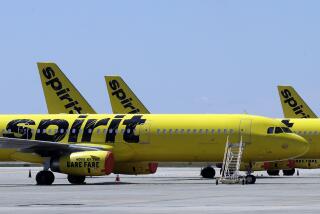Jury Acquits American in Air Price War : Travel: Airline was accused of attempting to bankrupt rivals Northwest and Continental by offering cut-rate fares.
- Share via
A federal jury Tuesday cleared American Airlines of allegations that it tried to force rivals Continental and Northwest out of business last year by slashing fares in an unprecedented price war.
Deliberating less than three hours, the jury in Galveston, Tex., said it failed to get past the first of six test questions posed by U.S. District Judge Samuel Kent: whether American intended to monopolize certain airline markets with its cut-rate fares. The jury would have had to answer “yes” to all six questions to decide the case in favor of Continental and Northwest.
Legal and airline industry observers said it is highly difficult to prove antitrust charges, particularly on a nationwide basis, as Continental and Northwest had alleged. Continental said it may seek an appeal.
“It has probably occurred on isolated routes and in isolated instances in the past,” said David Ulmer, vice president of Roberts & Associates, a Hayward, Calif.-based airline consulting firm. “But on a nationwide basis, it was much harder to prove.”
Northwest and Continental had sought $1 billion in damages. With the potential for triple damages in antitrust cases, American could have faced $3 billion in penalties.
The plaintiffs contended that American’s “value pricing” plan, which vastly reduced the types of fares and slashed prices by up to 40% in April, 1992, was designed to drive them out of business. American said it merely tried to simplify fares and generate profits.
American Airlines’ attorney Bob Cooper, a partner in the Los Angeles law firm of Gibson, Dunn & Crutcher, said: “The critical point that we were able to make . . . was that what American did was really just a legitimate decision to restructure the fares to be more competitive in the industry. What we did was not predatory.”
After a vicious fare war that saw each major airline matching or undercutting the others’ deep discounts, American abandoned value pricing last fall.
“I don’t think we’re going to see many more predatory pricing cases in the future,” said Matthew Mitten, an associate professor who teaches antitrust law at Houston’s South Texas College of Law. “It can occur in certain industries, (but) it’s just so hard to prove.”
“All of us are enormously pleased,” American Airlines Chairman Robert Crandall said after the verdict. “At the same time, we are outraged by the amount of time and money that we had to devote to defending these baseless charges.”
The Dallas-based airline spent more than $20 million and employed three law firms to defend itself. “The fact that it was such a ringing victory should hopefully deter this kind of litigation,” said Cooper.
Continental said in a statement that it is considering an appeal, maintaining that American acted with intent to harm it. “American heavily disguised its predatory pricing plan from its inception, and obviously the jury had difficulty seeing through its mask,” the airline said.
Joseph Jamail, a lawyer for Northwest, and David Boies, a lawyer for Continental, said they are unsure about the grounds for an appeal but will take a close look at the judge’s jury instructions.
More to Read
Inside the business of entertainment
The Wide Shot brings you news, analysis and insights on everything from streaming wars to production — and what it all means for the future.
You may occasionally receive promotional content from the Los Angeles Times.










